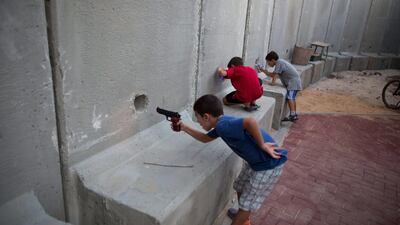On Monday October 28, 1996 I was almost 15 years old. I arrived home from school to a blaring television. An Arabic news channel was talking about a heinous crime committed by an Israeli settler against a 10-year-old boy in the West Bank. I was preoccupied with an impending school exam and didn’t pay much attention.
It wasn’t until the following day that Helmy Shousha’s name became imprinted on my mind. Holding the newspaper that day, I stared at the photograph of a 10-year-old boy, wrapped in a glossy satin white cloth and the Palestinian flag. His mother was leaning over his lifeless body, kissing his left cheek. I remember that despite his swollen face, he looked heartbreakingly peaceful, and very young.
I would subsequently learn that Nahoom Korman, an Israeli settler in the West Bank, killed Helmy using the back of his gun. In 1999, an Israeli court ruling decided that the killing was not deliberate. Korman was sentenced to six months of community service in an elderly care home and a $17,500 fine.
Many more Palestinian children, men and women would follow Helmy. These hate crimes committed by settlers would mostly go unpunished, creating an environment ripe for mutual hate and festering vengeance.
I don’t remember how old I was when I developed a passionate patriotism about my people’s cause. For Palestinians like myself, growing up in the diaspora and forced to tolerate the injustice of forced exile, that passionate patriotism is in your DNA.
I grew up in a culture that preached resistance as the only way to get our rights and freedom back, especially after so many failed peace initiatives and political power play. We are a small population facing one of the strongest forces in the world. It was empowering to watch Molotov cocktails and medium-sized stones being hurled at tanks and heavily armed soldiers by masked young men and women. Weak though we are, there is something we can still do to resist a strangling occupation, one that occupies your soul and your physical space.
And then you get to know about the darker side of resistance. Hijacked commercial planes, suicide bombers and the most recent: synagogue attacks using meat cleavers. A couple of days after the synagogue attack, I scrolled down my Facebook feed to see an image that would send a chill down my spine. The image was of an axe with drops of blood drops. It had a tag line that praised the synagogue “operation”.
It reminded me of Israel’s prime minister Benjamin Netanyahu’s praise for his most recent “operation” in Gaza. Hate crimes seems to have whole new terms now. The chill that runs down my spine and the rage that wells up in my heart spring from the realisation that we seem to be letting our moral standards slip.
As a patriotic Palestinian, you are unable to criticise. You are unable to condemn any act of aggression, violence or murder against your occupier. If you do, you are shamed by the long list of those that have been brutally murdered, tortured, kidnapped and insulted. If you do, your loyalties are questioned. If you do, you are told that the occupiers should bear the consequences. If you do, you are played endless videos of crying mothers, shown pictures of burnt children and read scripts of hateful speeches from rabbis inciting the murder of Palestinian children.
As much as I understand that these acts are the result of the environment of hate so carefully nurtured by Israel, I can’t help but reject this blind, bloodthirsty search for vengeance.
As much as I know that the collective punishment of Palestinians as a result of each act of vengeance will naturally fuel more hatred, I can’t endorse that either.
I know the kind of hopelessness that young Palestinians face after decades of terror, occupation and humiliation but I can’t accept these Israeli “operations” as the norm of Palestinian existence, resistance and identity.
When I condemn acts of vengeance by Palestinians, I fear the alienation of speaking up. But I fear, far more, the thought that extremism will take over the true Palestinian identity.
Rana Askoul is a UAE-based writer
On twitter: @RanaAskoul

